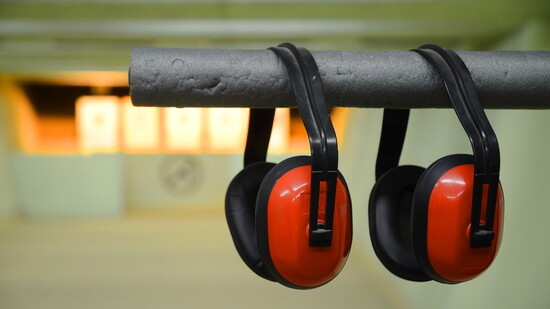Many guys don’t think twice about firing up a chainsaw, running a table saw, or hitting the range. It’s just part of life. Focusing on the job, the project, and the moment, hearing protection isn’t always top of mind.
Case in point: A local police officer sought help at Family Hearing after exposure to a sudden, high-impact noise. He immediately experienced hearing loss, pressure, and ringing, particularly in his right ear.
After the incident, pressure and hearing slightly improved, but ringing in his ears (tinnitus) persisted, making it hard to understand his son or follow conversations at work. While his hearing loss was mild, testing revealed significant challenges. Audiologists at Family Hearing created a tailored plan including hearing aids and specific exercises, and he can now communicate clearly, even in noisy settings.
Like our police officer, men often find themselves in high-noise environments—handling industrial machinery, shooting at the range, or working in loud conditions. These experiences come with the hidden cost of hearing loss. Men aged 35 and older are more likely to experience hearing loss than women, mainly due to noise exposure. The risks are often overlooked because these activities are closely tied to work or recreation.
Exposure to loud noises can cause irreversible damage to the hair cells in the inner ear. These cells are crucial for hearing and don’t regenerate once destroyed. Unlike a broken bone or a pulled muscle, hearing damage typically isn't painful, leading many to believe loud activities are harmless. But just because there’s no immediate pain doesn’t mean damage isn’t happening.
Understanding how loudness and exposure time relate is key to hearing safety. A lawnmower at 85–90 dB is safe for 2–8 hours, while a gunshot at 140–170 dB can cause instant damage without protection.
Chelsea Walters, B.S., BC-HIS, a seasoned hearing care professional at Family Hearing, compares noise exposure to sun exposure: “You’d never spend hours in the sun without sunscreen. The same goes for hearing—be aware of intensity and exposure time, and take breaks.”
Wearing hearing protection in loud settings, taking breaks, and getting regular check-ups reduces the likelihood of hearing loss. “Ironically, the very activities that build skills and strength can also lead to communication challenges,” says Dr. Christopher Schweitzer, a veteran audiologist at Family Hearing. Many men who thrive in physically demanding, noisy environments struggle to hear everyday conversations later in life, affecting relationships, work performance, and overall well-being.
And that’s what it’s all about—connecting to the sounds that keep us present in the moments that matter, whether catching every punchline with the guys or savoring your child's whispered secret. Men thrive and perform at their best when they can communicate clearly; confidence, success, and strong connections naturally follow.
While men are on the front lines regarding auditory risk, recognizing these dangers and taking proactive steps to protect their hearing can preserve communication and quality of life. After all, true strength isn't just about enduring challenges—it's about taking care of yourself, ears included.
While men are on the front lines when it comes to auditory risk, recognizing these dangers and taking proactive steps to protect their hearing can preserve communication and quality of life.
